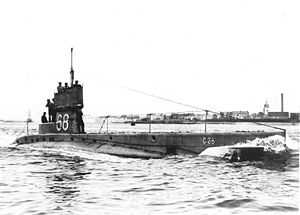HMS C11
From Wikipedia, the free encyclopedia
 HMS C38 - a typical C-class submarine | |
| Career (UK) | |
|---|---|
| Name: | HMS C11 |
| Builder: | Vickers, Barrow |
| Laid down: | 6 April 1906 |
| Launched: | 27 March 1907 |
| Commissioned: | 3 September 1907 |
| Fate: | Sunk in collision, 15 July 1909 |
| General characteristics | |
| Class & type: | C-class submarine |
| Displacement: |
287 long tons (292 t) (surfaced 316 long tons (321 t) (submerged) |
| Length: | 143 ft 2 in (43.64 m) |
| Beam: | 13 ft 6 in (4.11 m) |
| Installed power: |
600 hp (450 kW) (petrol engine) 200 hp (150 kW) (electric motor) |
| Propulsion: |
1 × Vickers petrol engine 1 × electric motor 1 × screw |
| Speed: |
12 kn (14 mph; 22 km/h) (surfaced) 7 kn (8.1 mph; 13 km/h) (submerged) |
| Range: |
1,500 nmi (1,700 mi; 2,800 km) at 7 kn (8.1 mph; 13 km/h) (surfaced) 50 nmi (93 km) at 4.5 kn (5.2 mph; 8.3 km/h) (submerged) |
| Complement: | 16 |
| Armament: | 2 × 18 in (460 mm) torpedo tubes (2 torpedoes) |
HMS C11 was a British C-class submarine built by Vickers, Barrow. She was laid down on 6 April 1906 and was commissioned on 3 September 1907.
C11 was sunk in a collision with the collier Eddystone in the North Sea south of Cromer, Norfolk on the 14 July 1909.[1] There were only three survivors.[1] The wreck was discovered in the late 1990s.
External links
References
- ↑ 1.0 1.1 Gray, Edwyn (2003). Disasters of the Deep A Comprehensive Survey of Submarine Accidents & Disasters. Leo Cooper. p. 64. ISBN 0-85052-987-5.
- Hutchinson, Robert (2001). Jane's Submarines: War Beneath the Waves from 1776 to the Present Day. London: HarperCollins. ISBN 978-0-00-710558-8. OCLC 53783010.
This article is issued from Wikipedia. The text is available under the Creative Commons Attribution/Share Alike; additional terms may apply for the media files.